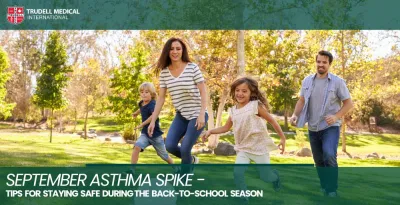Asthma is a common chronic respiratory condition that affects hundreds of millions of people around the world.1 During the summer months, individuals who suffer from asthma may experience a rise in symptoms. These symptoms can include more frequent coughing, wheezing, tightness in the chest, difficulty breathing, and an increase in the occurrence of asthma attacks.2 These exacerbations can be linked to a variety of factors such as allergens, pollution, lifestyle choices, and the weather that is commonly associated with the summer season.
Nevertheless, it is feasible to handle asthma symptoms during the summer season. This necessitates implementing a proactive strategy that involves comprehending the asthma triggers prevalent in the summer, monitoring symptoms on a daily basis, and creating a customized asthma action plan. With the correct planning, people with asthma can enjoy a wide variety of summer activities and on-the-go adventures!
The Impact of the Summer Season on Asthma
Warm Weather: There are several reasons why the summer season can cause increased symptom occurrence for people with asthma. Firstly, the heat and humidity associated with summer months can aggravate a person’s asthma by further narrowing and constricting airways, making it more difficult to breathe.2
Ozone and Air Pollution: Another factor associated with summer months is increased ozone levels and air pollution. Increased amounts of direct sun light and longer daylight hours associated with the summer season react with compounds found in vehicular and industrial air pollution to form increased levels of ozone.3 Ozone is a major component of smog, which decreases air quality and can cause respiratory issues for everyone, but especially people with asthma. On top of making asthma symptoms worse, increased pollution from ozone can irritate the respiratory system, damage cells that line the lung, and reduce lung function.2
Allergens: Pollens and mold spores are very common triggers for people with asthma if they have allergies. Grass pollens, weed pollens, and mold spores are common allergens present during the summer months and are carried by the hot and humid wind during summer months, making them very easy to inhale.4 These allergens can aggravate airways and cause increased asthma symptoms.
Activities: Warm weather presents an enticing opportunity for individuals to participate in various outdoor activities. However, it's important to be aware that exercise itself can impact asthma symptoms. When engaging in physical activity, breathing through the mouth increases, which can cool and dry the airways, potentially triggering discomfort for individuals with asthma. This phenomenon, known as exercise-induced bronchoconstriction, can contribute to the narrowing of airways and make breathing more challenging.
Moreover, the act of increased respiration during outdoor exercise leads to a higher intake of pollutants, allergens, and ozone within a shorter timeframe. This combination of heightened physical activity and exposure to environmental factors significantly increases the risk of airway inflammation and subsequent asthma symptoms. It is crucial for individuals with asthma to take appropriate precautions, such as using prescribed medications or utilizing a spacer device, to manage these potential triggers and maintain control over their condition during physical exertion.5
Actions You Can Take to Help Reduce Symptoms
Monitor the presence of triggers: When planning a day outside, don’t forget to check the appropriate platforms to see what asthma triggers are outside. This includes checking pollen count reports online to see if there is an increased presence of allergens in your area and monitoring Air Quality Health Indexes (AQHIs) to determine the level of pollution in your community. If either index is high, consider planning indoor activities and having a rescue inhaler nearby to relieve potential exacerbations.
Plan activities for the early morning: Consider scheduling outdoor activities for the early morning to avoid being outside during the hottest parts of the day. The morning also tends to be when the air quality is the best, thus reducing the potential to experience increased asthma symptoms.
Stay hydrated: When outdoors, drink plenty of water to remain hydrated. Water thins mucus in the airway, which makes it more difficult for the mucus to build up in the lungs and keeps your airway uninflamed.
Develop an Asthma Action Plan: If you have asthma, consider developing a personalized asthma action plan with your healthcare provider. An asthma action plan is a written plan that outlines your asthma triggers, symptoms of an asthma attack, medications you take to manage your asthma, and when to seek medical attention.
Be prepared: If you have been prescribed an inhaler your healthcare provider, be sure to bring it with you wherever you go and use it as instructed. When using an inhaler, you should also consider using a chamber, which increases the amount of medication that is delivered to your lungs.6 The AeroChamber2go* chamber can help you increase the effectiveness of your medication and store your inhaler when you are on-the-go this summer!
